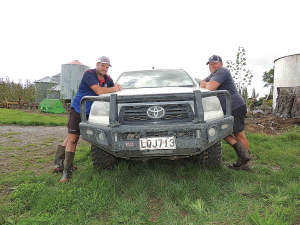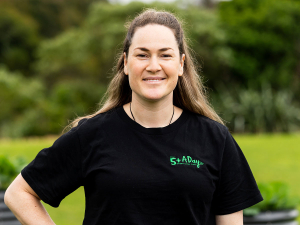Two high producing Canterbury dairy farmers are moving to blended stockfeed supplements fed in-shed for a number of reasons, not the least of which is to boost protein levels, which they can’t achieve through pasture under the region’s nitrogen limit of 190kg/ha.
John Frew and Dan Mulholland both farm near Darfield on farms converted a few years ago from cereal production to dairy. Dean Weastell, J Swap Stockfoods, says both farmers have over time transitioned to buying blends, ensuring the feed they’re using has the higher protein levels their herds needed.
“Canterbury’s seasons have got later, and because of the N-cap, often the grass won’t have the protein levels when they need it,” says Weastell.
So, the cereal guys find they need more protein around mating, for example – not just PKE (palm kernel) but also DDG, canola or soybean meal.”
John Frew, Essendon Farms, manages a 240ha effective platform with 130ha support, fully irrigated with a centre pivot plus 60ha under a Rotarainer. He runs a team of four staff – “a good crew who have been with me for over three years” – milking 840 Friesian cross cows, bred with a focus on udders and capacity. He says with high-end feeds, “you need the right cow to realise the potential”.
Frew has worked for farm owner Paul Jarman for six years and is now moving from a manager role to a 50:50 sharemilking contract, saying the support from the farm owners has been great.
The farm still grows some barley and was a traditional cereal feeding operation, largely self sufficient, using its own grain. This was John’s first season using a blend and he has had good results.
“We’re still learning what blends work best but our confidence is growing, and Dean’s been good, giving us a steer on the blends and trigger points. He’s been a big help, and the pricing is always fair.
“Our protein levels dropped mid-January, so we got in a blend of 60% PKE plus 20% DDG and the rest barley – protein levels shot back up as did milk ureas.
“There’s still a place for cereals and we still use 20% barley across a season. The mixed feeds level out your production though, so you don’t get that roller coaster effect, and the PKE is often cheaper than grass.
“We’ll also start adding minerals into the feed to help the animal health. The dosing is more accurate doing it through the in-shed feeding rather than in the paddock."
He says he likes the flexibility he gets using J Swaps. “They’ve always got what you want and can deliver it when you need it – even at short notice, if you get caught short. Service is the key really."
Not far up the road towards Darfield township, Dan Mulholland farms 240ha of irrigated land, at peak milking 820 mixed Kiwi-cross Friesians – also running a team of four staff.
He has had his first full season of in-shed feeding, giving each cow 4kg of supplement per day until December then backing it off gradually to 2kg/cow by March.
“With the 190 N-cap (down from 260kg/ha), you can’t get enough protein in the grass early in the season when you need it,” says Mulholland.
“So, we feed them up to get a flying start in the early part of the season. Production usually drops off later in the season but it’s held better on the mixed feed. Buying the mixed feeds is the only way you can get enough protein into a 4kg ration.
“We also now get a custom blend with minerals in the feed.
“The mixes depend on the season. We can change the blend as conditions require, all at the contract price.”
Weastell says Mulholland has had very good results through spring, using a pre-mating premix with mineral pack to get production and animal health benefits.
Contract Buying Cheaper
Dan Mulholland and John Frew both buy ahead on a 12-month contract from J Swap Stockfoods, saying it is “always cheaper than the spot price”, and that ordering ahead helps with cashflow.
“And because we don’t have to store the feed like we used to with barley, you pay as you use it, and as you get the benefit,” says Mulholland.
Dean Weastell, J Swap Stockfoods, encourages customers to book a blend at the start of the season.
You need confidence the payout will support it, but it allows flexibility to change the blend as you go, to manipulate the protein: feed ratio,” says Weastell. “They’ll typically chase the production, then keep condition on for mating, backing off the protein by late Jan-Feb to more of a maintenance level to reduce costs.”
Weastell says customers are not just buying feed from J Swap, but also servicing their animal health requirements via the mixed feeds.
“Canterbury farmers tend to want to maximise production and also have us take care of the animal health additives. I’ll discuss in more detail with farmers what their nutritional requirements are, not just sell them tonnage.”
Weastell operates out of J Swap Stockfoods’ store in Christchurch, selling direct to farmers in all regions of Canterbury, the West Coast and further north.
He says the fully integrated service they offer is a key point of difference. J Swap runs its own trucks, including the ‘blower’ and augur trucks, runs double shifts and offers reliability and flexibility with delivery.

















